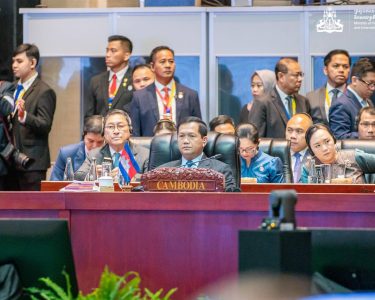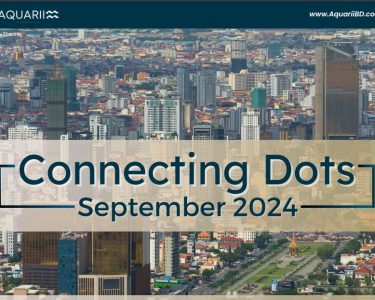Cambodia Investment Review
In 2023, Cambodia’s macroeconomic landscape has demonstrated resilience in the face of significant global economic uncertainty. Despite external pressures, the country’s balance of payments (BoP) recorded a slight deficit, with exports weakening. According to the National Bank of Cambodia, the overall balance as a percentage of GDP showed a deficit of 0.4% in 2023, after a brief surplus in previous years.
Download the full report here.
Trade and Investment Trends
Cambodia’s trade balance reflected this trend, with a notable decrease in export growth and a persistent trade deficit. The trade balance as a percentage of GDP stood at -7.0% in 2023, a slight improvement from the previous year’s -22.1%. These figures highlight the continued challenges in the export sector, exacerbated by global economic conditions. The financial account, which includes net error and omission, also saw fluctuations, indicating varying levels of capital flow and investment confidence.

Foreign Direct Investment (FDI) inflows have shown signs of recovery, yet the rebound has been uneven across sectors. Data from the Council for the Development of Cambodia reveals that FDI inflows reached USD 4 billion in 2023, with the financial activities sector receiving the largest share. China remains the dominant source of FDI, contributing 56% of the total inflows. Other significant contributors include Korea (10.2%) and Canada (9.5%). The manufacturing and real estate sectors also attracted substantial investments, though the pace varied, reflecting sector-specific dynamics and global investor sentiment.
The exchange rate of the Cambodian Riel (KHR) has remained broadly stable despite some pressures. The National Bank of Cambodia reported that the KHR/USD exchange rate index stood at 95.57 in 2023. Meanwhile, international reserves have remained adequate, with the reserves-to-imports ratio stabilizing at 7.1 months. This stability in the exchange rate and adequate reserves underscore the central bank’s effective monetary policies and the economy’s ability to withstand external shocks.
Sectoral Growth and Fiscal Challenges
Cambodia’s economy grew by 5% in 2023, driven primarily by the manufacturing and service sectors. The National Institute of Statistics highlighted the significant contributions from finance, insurance, and trade, accommodation, and food services. However, the growth across sectors has been heterogeneous and below the pre-pandemic trajectory, indicating the need for more concerted efforts to sustain economic growth. The construction sector has shown signs of recovery from the pandemic, but the real estate sector continues to face challenges due to external conditions. The residential property price index has seen a decline in annual percentage change, reflecting market adjustments and external economic pressures.

The tourism sector experienced a quick rebound in international tourist arrivals, yet the quality of recovery appeared less promising. The Ministry of Tourism reported that international arrivals by air increased to 66% in 2023, compared to 34% by land and waterways. Despite the rise in arrivals, the overall recovery in tourism receipts and visits to key attractions like Angkor Wat has been slower. This uneven recovery indicates that while tourist numbers have increased, spending and engagement levels have not fully returned to pre-pandemic levels.

Inflation rates in Cambodia have stabilized, with the headline inflation rate decreasing significantly in 2023. The National Bank of Cambodia noted that core inflation and food prices were the primary contributors to the overall inflation rate. Additionally, financial dollarization remained high, with foreign currency deposits constituting 90.3% of total deposits. This high level of dollarization reflects ongoing confidence in foreign currencies and highlights areas for potential policy focus to strengthen the national currency’s role.
Fiscal challenges have been prominent, with lower revenue collections coupled with higher expenditures widening the fiscal deficit. The Ministry of Economy and Finance reported a fiscal deficit of 2.6% of GDP in 2023. Government external debt has also increased, reaching 26.2% of GDP, reflecting the government’s efforts to finance expenditures amid declining revenues. This rising debt level, coupled with a widening fiscal deficit, underscores the need for fiscal consolidation and strategic planning to ensure long-term economic stability.





